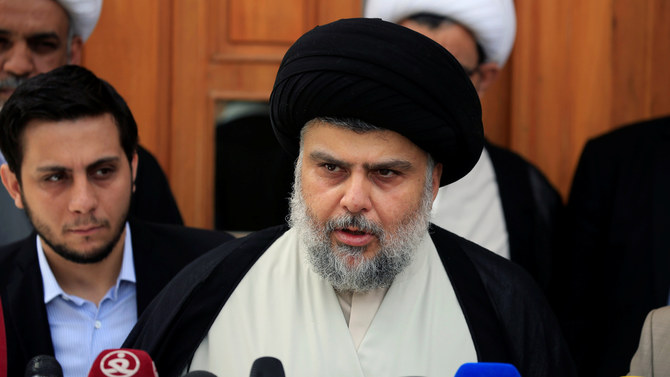
- ARAB NEWS
- 15 Jul 2025

In one of the most outrageous political U-turns in recent memory, Muqtada Al-Sadr has pivoted from wholehearted support for Iraq’s uprising to sending his shock forces to kill demonstrators and violently break up protest camps. After months of Al-Sadr’s rhetoric about listening to the voice of the people, a terse message this weekend baldly stated: “Protesters should not interfere in political matters.”
Shockingly, most of the killings of protesters by Al-Sadr’s supporters occurred in the holy cities of Najaf and Karbala. This is the beating heart of the Shiite world, where Tehran has labored hardest to entrench its influence; yet hundreds of thousands of furious residents consistently demand an end to corrupt, sectarian governance and Iranian interference.
These protesters are now turning their fury on Al-Sadr himself, accusing him of abandoning his flirtation with the protest movement and aligning with pro-Tehran factions to profit from lucrative government appointments. In what protesters have denounced as a “political coup,” Tehran’s proxies and Al-Sadr have colluded to appoint a nonentity as prime minister with the intent of perpetuating the status quo, while affording themselves breathing space to crush the protests.
Throughout the 1970s, Iraq’s immense oil wealth made it one of the most advanced states in the region. Having undergone a succession of catastrophes since then, today’s Iraq sees a governing elite cream off billions, while citizens endure grinding poverty, unemployment and dysfunctional services. Just as in Lebanon, Iraq’s nationwide protests didn’t erupt against a specific prime minister or government policy, but against the governing system as a whole.
This isn’t the first time Al-Sadr has performed self-serving, 180-degree ideological somersaults. He repeatedly oscillated from being one of Iraq’s foremost paramilitary warlords to denouncing militias for “slaughter, assassinations and… distorting Islam.” Despite branding himself as an anti-sectarian nationalist, Sadrist thugs abducted and murdered tens of thousands of Sunnis between 2005 and 2008. After 2014, Al-Sadr’s “Peace Brigades” militia had one foot in and one foot out of the Iran-dominated Al-Hashd Al-Shaabi paramilitary coalition.
In about 2015, Al-Sadr sought to return to political relevance under a reform banner, yet government departments under Sadrist control circa 2005 were notorious for corruption and criminality. The Sadrist Ministry of Health was nicknamed the “Ministry of Murder” because his foot soldiers reportedly prowled hospital wards slitting the throats of Sunnis and dissidents. Ambulances became the chosen vehicles of death squads.
Al-Sadr has veered from attention-grabbing political stunts (such as his 2016 invasion of the Green Zone) to bouts of petulant withdrawal from the political field altogether. No wonder the speculation about whether Al-Sadr is a bipolar manic depressive.
This isn’t the first time Al-Sadr has performed self-serving, 180-degree ideological somersaults.
Baria Alamuddin
In about 2004, Al-Sadr was gratefully accepting Iranian funding to destabilize Iraq. He was even based in Qom between 2007 and 2011, but began spouting anti-Iranian rhetoric after his return to Baghdad. During Al-Sadr’s visit to Tehran late last year, Qassem Soleimani and Ali Khamenei sought to return him to Iran’s orbit. There have been reports of discreet visits by Al-Sadr and his former subordinate Qais Al-Khazali to Iran in recent days.
Iran has resorted to various methods of influencing the unpredictable Al-Sadr; from buying him off to threats of assassination and face-to-face meetings with his idol, Hassan Nasrallah. If Al-Sadr is indeed today acting at Tehran’s behest, it is unclear what his current motivations are.
One reason that Tehran’s proxies are rushing to form a government is their fear of new elections. Pro-Iran elements won a pitiful share of the vote in 2018, yet were able to dominate the new administration thanks to vigorous lobbying by figures like the late and unlamented Soleimani.
Having spent recent months effectively waging war against Shiite citizens throughout the south, where do Hadi Al-Amiri, Al-Khazali and Al-Sadr expect their votes to come from now? The pro-Iran Bana list would be lucky to get even 10 percent of the vote. Al-Sadr may fare even worse, having betrayed his loudly proclaimed principles. Thus, if Sunnis, Kurds and moderates aligned themselves around a broad-based, non-sectarian coalition it would be possible to shut out Iran-backed entities altogether. Indeed, according to the constitution, figures affiliated with paramilitary forces should not be allowed to participate in politics at all.
Leading cleric Grand Ayatollah Ali Al-Sistani has already called for a new round of free and fair elections, and protesters have urged him to categorically reject new Prime Minister Mohammed Allawi. If there are fresh elections, militias and foreign-aligned elements should be excluded from the process, with Al-Hashd-dominated departments like the Interior Ministry also kept at a distance.
Iran’s proxies have sought to discredit the protest movement by alleging manipulation by foreign embassies. Unfortunately, far from manipulating the situation behind the scenes, Western diplomats are sleeping at their posts. Where is the international community on attacks against citizens and pressures for reforms and uprooting corruption?
Iraq is the central plank in Tehran’s campaign of regional expansionism. The US and others should be capitalizing on Iran’s recent setbacks, as slamming the door on Tehran’s fingers in Iraq would have a huge impact on its ability to project its influence in Syria and Lebanon.
Even after the deaths of well over 650 protesters, the wounding of more than 20,000, and with reports of hundreds of disappearances, protesters remain as determined as ever. The “political coup” by pro-Iran elements has only achieved one thing: When millions of protesters come out in future months, we won’t see generalized slogans condemning corruption and misgovernance across the board, but rather Al-Hashd and Al-Sadr have put themselves firmly in the cross hairs. They are now widely loathed, even by the segments of society that relatively recently lauded them as popular heroes and saviors from the scourge of Daesh.
Instead of hijacking the Iraqi revolution, Al-Sadr and Iran’s henchmen have simply ensured that they are the ones standing in the eye of the storm when the revolution definitively arrives.